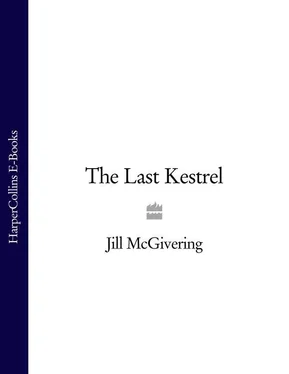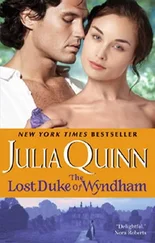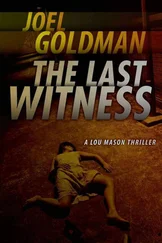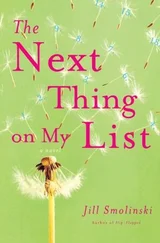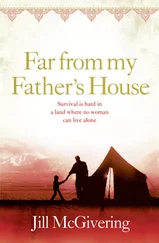On the fourth day, they turned off the road and bumped along dirt to a cluster of mud-brick houses. A boy, herding goats, flattened himself against a wall to watch and was turned to a ghost by the fine brown dust beaten up by the wheels. Beyond him a thin man was tugging at a donkey whose body was rendered invisible by a vast load of brushwood. A girl with a dirt-encrusted face ran to the man and clutched at his leg as they passed, her eyes round.
The schoolteacher, a contact of Jalil’s, greeted them warmly. They sat cross-legged on cushions in his bare front room and drank green tea from tall glasses. Jalil translated back and forth. Yes, the schoolteacher told them, his voice measured, everyone in the village knew about the elections. He was encouraging them all to vote. But would the politicians help them? He had his doubts. Would they bring electricity to the village? And then, there was the school. He shook his head, his eyes pleading. He hadn’t been paid his salary for so long now, for four, five months. How could he—?
The throb of an approaching truck interrupted him. He looked towards the window, nodded to Jalil and, in the doorway, pushed his bare feet back into the sandals waiting there. Ellen sipped her scalding tea and listened to the slam of a truck door outside, then low voices.
The man who entered with him smiled round. He had a short beard and a brown Afghan hat and greeted them with easy confidence. Ellen sat up, interested, to watch. My cousin, said the schoolteacher, and clicked his fingers to his son to run for a fresh chai glass. Just a few minutes later, before the conversation had really resumed, Jalil got to his feet, thanked the schoolteacher and ushered Ellen hastily out of the house.
‘That was abrupt.’ Ellen watched the passing landscape with dismay from the back seat of the vehicle. They’d spent several hours driving out to find the schoolteacher and she’d left with barely half an interview. ‘What’s the hurry?’
Jalil was sitting in the front passenger seat by the driver. He mumbled something she didn’t catch.
‘He had more to say,’ she went on. The late morning sun was intense. Her head, encased in a headscarf, was already hot. ‘We didn’t have to leave just because his cousin came.’
‘That man he calls his cousin,’ Jalil turned back to her and lowered his voice, ‘he is not a good man.’
Ellen shook her head. ‘Why do you say that?’
Jalil raised his hand and worked it open and closed like the mouth of a glove puppet. ‘Blah blah,’ he said, snapping his thumb against his fingers. ‘He is a man to go blah blah blah to someone. To some powerful man. He came rushing to see us for a reason.’ He stared at Ellen. His voice had dropped to a whisper. ‘Maybe he is going blah blah to some Taliban.’
Ellen glanced out of the window at the swirling dust, the blank brown landscape. They were in the middle of nowhere. ‘Oh, come on.’
When she looked back at Jalil, he was frowning.
‘Maybe they’re just cousins.’ She sighed to herself. She’d hurt his pride. ‘He seemed friendly enough.’
‘You saw his smile?’
‘What about it?’
Jalil pointed to his own mouth. ‘So much of gold in his teeth. New gold.’
Ellen shrugged. So what? He had gold teeth.
‘His watch?’ Jalil ran his hand round his wrist. ‘Foreign watch. New.’ Jalil paused, watching her reaction. ‘Who gave him all this money?’
He faced forward again. His hair was sticking together in clumps along the top of his neck.
Ellen thought about what he’d said. The teeth, the watch. She hadn’t noticed them. Jalil had. ‘He could be a businessman,’ she said. ‘A trader.’
Jalil gave a dismissive grunt. ‘Business?’ He gestured out of the window at the emptiness of the desert. ‘Here?’
She paused and considered. Maybe Jalil was smarter than he looked. He just wasn’t loud. ‘Blah, blah,’ she said. She was used to Afghan men with big egos. Jalil was different. She lifted her own hand and opened and closed it like a mouth, as he had done. ‘Blah blah, blah blah.’
He turned back to see and she snapped her hand open and closed at him until they both started to laugh, saying ‘blah, blah’ stupidly to each other as the driver swung back onto the road and they headed through the dry, swirling dust towards the next village.
Now, in this grieving house, the call to prayer gave a final burst of static and came to a close. Silence reached into the room. Ellen shifted her weight. It was already late.
‘ Manana .’ Thank you. She placed her right hand on her heart in a gesture of thanks and bowed her head to Jalil’s mother. Ellen unravelled her legs and rubbed her ankles to bring them back to life. She reached forward to gather together the scattered dishes and help to clear them. Jalil’s sister protested, pushing Ellen’s hands away and scolding her softly, as Ellen knew she would.
In the dim hallway, she covered her head with a voluminous scarf, wound the ends round her neck to keep it in place and bent to lace up her boots. Jalil’s mother had retreated to the kitchen and only the daughter was hovering, adjusting her own scarf nervously in folds round her head and shoulders as she watched Ellen prepare to leave.
Ellen gestured the girl to come towards her. In a quick movement, she took a bundle of dollars from her pocket, folded the girl’s long fingers round the money and enclosed her hands for a moment in the mesh of her own. Behind them rose a clatter of dishes, shifting in the sink. A tap coughed and water splashed onto a hard surface. The girl hesitated and opened her mouth to protest.
‘ Balay ,’ said Ellen. Yes. Her voice was firm. ‘Please.’
The girl prised off Ellen’s fingers and thrust the money back at her. Her eyes were proud. She knows what Jalil asked me, Ellen thought. She blames me. The money was thick and greasy in her hands. Dirty. She pushed it back into her pocket. She and the girl stared at each other, unspeaking.
The moment was ended by Jalil’s mother who came out to them from the kitchen, wiping her hands on a towel. Her scarf had fallen back to her shoulders. Her hair, prematurely grey, was clipped into a bun, dripping strands.
She embraced Ellen, kissing her on both cheeks, then pressed herself against her body. She smelt of rose-water and spices and her hair was dry and prickly against the soft skin of Ellen’s neck. She pulled back and took Ellen’s hands in her own. She clasped them, looking up into her eyes. Her palms were hot and firm. Her eyes looked so like his. Deep brown with fragments of light radiating outwards. As she spoke, Ellen read the concern there.
‘Don’t go, she is saying.’ The daughter was standing beside them, her voice cool as she translated her mother’s words. ‘It’s too dangerous. Don’t go to Helmand, she says. Go back to your own country and forget your work here. Be safe.’
His mother embraced her a second time. Ellen felt the hardness of the smaller woman’s ribs against her own flesh, the compact muscle of years of labour.
‘I must go,’ she said at last. She put her hands on Jalil’s mother’s shoulders and lifted her away. ‘I’ve got stories to file.’
His mother was reaching up to Ellen’s cheek, patting it with a cupped hand.
‘I’ll find out,’ Ellen said. ‘Tell her. I’ll find out what happened to Jalil.’
His mother spoke once more as her daughter unbolted the door and opened it. The family’s guard, standing outside in the shadows, rushed forward, his rifle glinting in the half-light. He escorted Ellen across the shabby courtyard to the high metal gate set in the compound wall. His mother had used one of the phrases Jalil had taught Ellen in the time they’d worked together. One she didn’t need anyone else to translate for her. May Allah bless you, she’d said. May Allah protect you.
Читать дальше
